How did Zohran Mamdani win over New York’s small restaurants?
A dispatch from NYC by Apoorva Tadepalli.
Good morning, and welcome to Vittles! Last week, we announced Issue 2 of our magazine – titled ‘Bad Food’ – which goes to print this week. We’re selling through the issue quickly, so if you wish to guarantee a copy then you can pre-order the magazine now. If you order before 1 December, you will receive it for a discounted price, with an extra discount for paid subscribers (see the original email for details).
At Vittles, we often think about how to write responsibly about small, immigrant-run restaurants in London – not solely as an asset to their communities, or as a treat for consumers, but as a universal benefit to the city. This is why we’ve taken a strong interest in the mayoral campaign of Zohran Mamdani, which has used these types of restaurants to communicate the candidate’s policies for the city and celebrate what is joyful about living there.
As New Yorkers go to the polls, with Mamdani a strong favourite to win, we think it is worth analysing how the campaign’s unusual focus on small restaurants has worked, its potential pitfalls and what leftist candidates in other cities like London can learn from it. In today’s newsletter, a rare dispatch from America, Apoorva Tadepalli has talked to halal vendors, community organisers, historians and restaurant owners to find out more about their support for Mamdani’s campaign and how these restaurants may have played a crucial part in determining the next mayor of New York.
In June 2025, Gyro King, a popular halal chain across Brooklyn and Manhattan, organised a picnic to celebrate Zohran Mamdani’s victory in the New York City Democratic primary for the mayoral race. Zakarya Khan, the chain’s owner, worked with Mamdani to serve 500 free meals of halal chicken and rice in Prospect Park. He spent around $2000 on those meals, but that didn’t bother him. ‘The message was to tell the public that people are happy,’ he told me over the phone recently. ‘That small businesses are happy, and immigrants, minorities [in the city] are happy … [about] seeing someone who is one of us, win.’ Khan has owned Gyro King for twenty-five years and has lived in New York City for nearly thirty. He first met Mamdani in March 2020, when the candidate joined his food pantry to help hand out meals. ‘Food has always been a part of all activism and political activity. And it is central to all of [Zohran’s] events’, he said.
“Food has often been used in political campaigning to help candidates appear more authentic, but this focus on small, immigrant-run restaurants during the Mamdani campaign is unprecedented within American politics”
As publications like the New York Times and the New Republic have noted, restaurants and food carts have been the site of much of Mamdani’s campaigning over the course of the year. He is often eating in videos – whether it’s lamb over rice while filming halal cart vendors, a burrito on the subway after fasting for fourteen hours, or a plate of biryani with his hands during an interview (this last one has provoked outlandish, racist backlash across social media, with users on X saying that ‘Civilised people in America don’t eat like this’ and ‘My dogs are cleaner and more civilised’). In September, he discussed policy with Bernie Sanders over Indian food in a tiny, modest Midtown restaurant, while, more recently, New Yorker editor David Remnick asked Mamdani to recommend his go-to restaurants (‘lamb adana laffa at Zyara’). In return, these establishments have embraced Mamdani; Ayat, a Palestinian restaurant based in Bushwick, has been offering free meals to canvassers, while Little Flower cafe in Astoria worked with Mamdani to host the thousands of supporters who participated in his viral scavenger hunt across the city in August.
Food has often been used in political campaigning to help candidates appear more authentic, but this focus on small, immigrant-run restaurants during the Mamdani campaign is unprecedented within American politics. Before the 2020 presidential election in the US, Eater observed that ‘the optics of what politicians eat, and how they eat it, have never been more carefully considered.’ For Mamdani, however, eating – and living – in a joyful and collective way is more than a political posture; it is inextricable from the social and political values of cohabitating in New York (which is all the more significant, given that his primary opponents are well known for their hatred of the city). His campaign shifts the focus away from relatability and towards how policy can support the small businesses that keep those values alive.
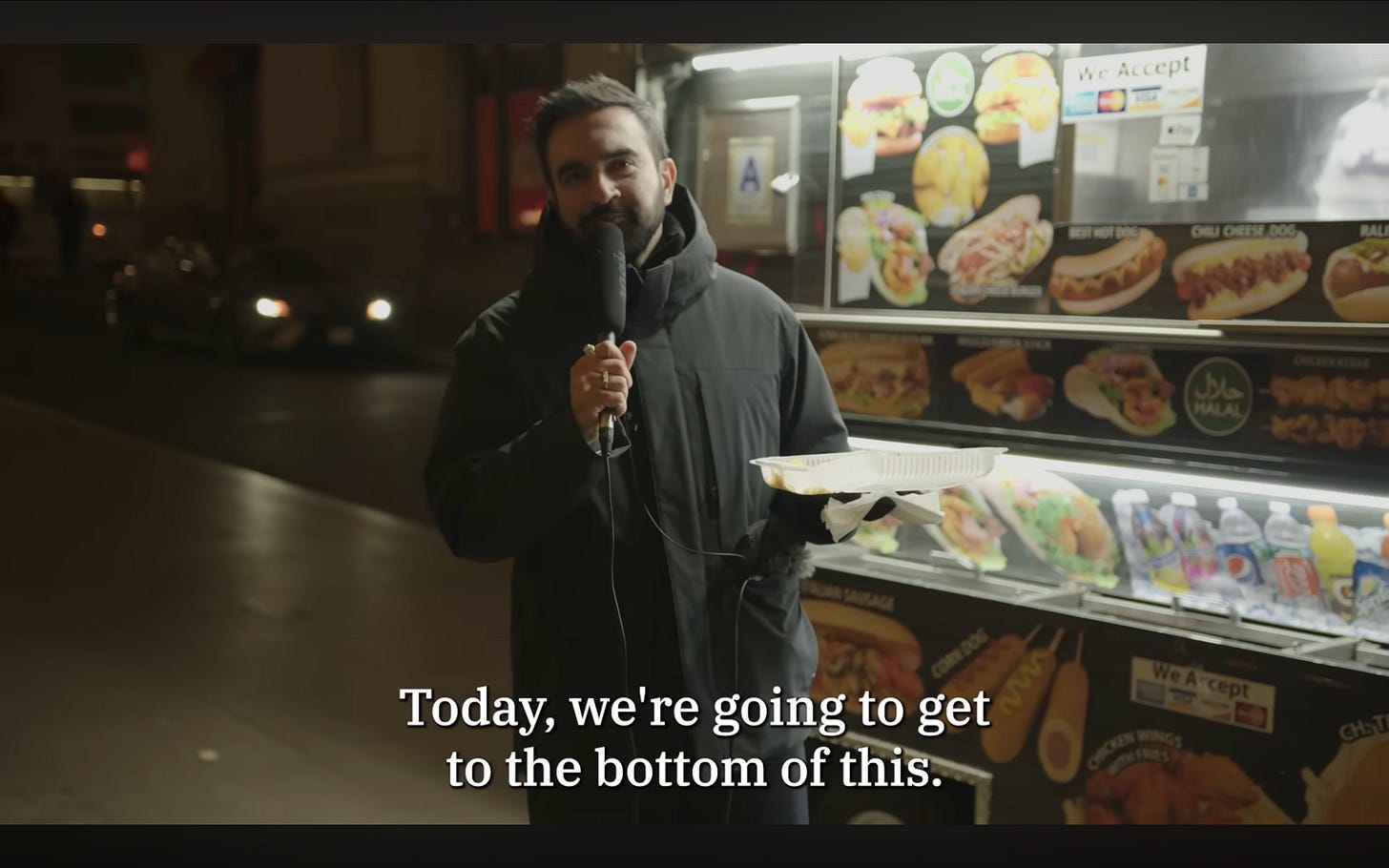
In January, Mamdani released his popular ‘halalflation’ video, highlighting the difficulties street food cart vendors face as they try to make a profit when their permits are withheld due to city bureaucracy. Halal has a specific meaning within Islam, but in New York it’s also often used as a shorthand for quick, accessible and affordable meals. In the video, Mamdani speaks to halal cart vendors near City Hall, the seat of the city’s legislative and administrative functions. The video focuses on how these vendors are paying exorbitant rates to sell their food – between $17,000 and $22,000 to a permit owner (‘a random guy,’ one of them clarifies) – for a licence that could be bought from the city for around $400. Because of this debt, they say, they have had to raise their prices from $8 to $10 for a plate of lamb or chicken over rice.
‘Food in itself becomes an anchor for a wider conversation about affordability, equity and accessibility’
With ‘halalflation,’ Mamdani ‘invented his own term to convey his love for these places,’ Asad Dandia, a public historian of Muslim New York told me, ‘but with [the video] food in itself becomes an anchor for a wider conversation about affordability, equity and accessibility.’ In the video, Mamdani highlights four bills sitting with the City Council that could help more vendors get their permits directly and on quicker timelines from the government, promising that ‘if I was mayor, I’d be working with City Hall from day one to make halal eight bucks again.’
Mamdani often points out how governance affects small businesses and food establishments: in a video titled ‘Small Business, Big Priority’ which was released earlier this year, he promised to appoint a ‘Mom and Pop Czar’ to protect delis, bodegas and other small businesses by lightening regulations, fast-tracking applications, and cutting fines by 50 per cent. A few days ago, he won an endorsement from the United Bodegas of America, in which he holds up an egg, cheese and jalapeño roll (the ‘Zohran special’).
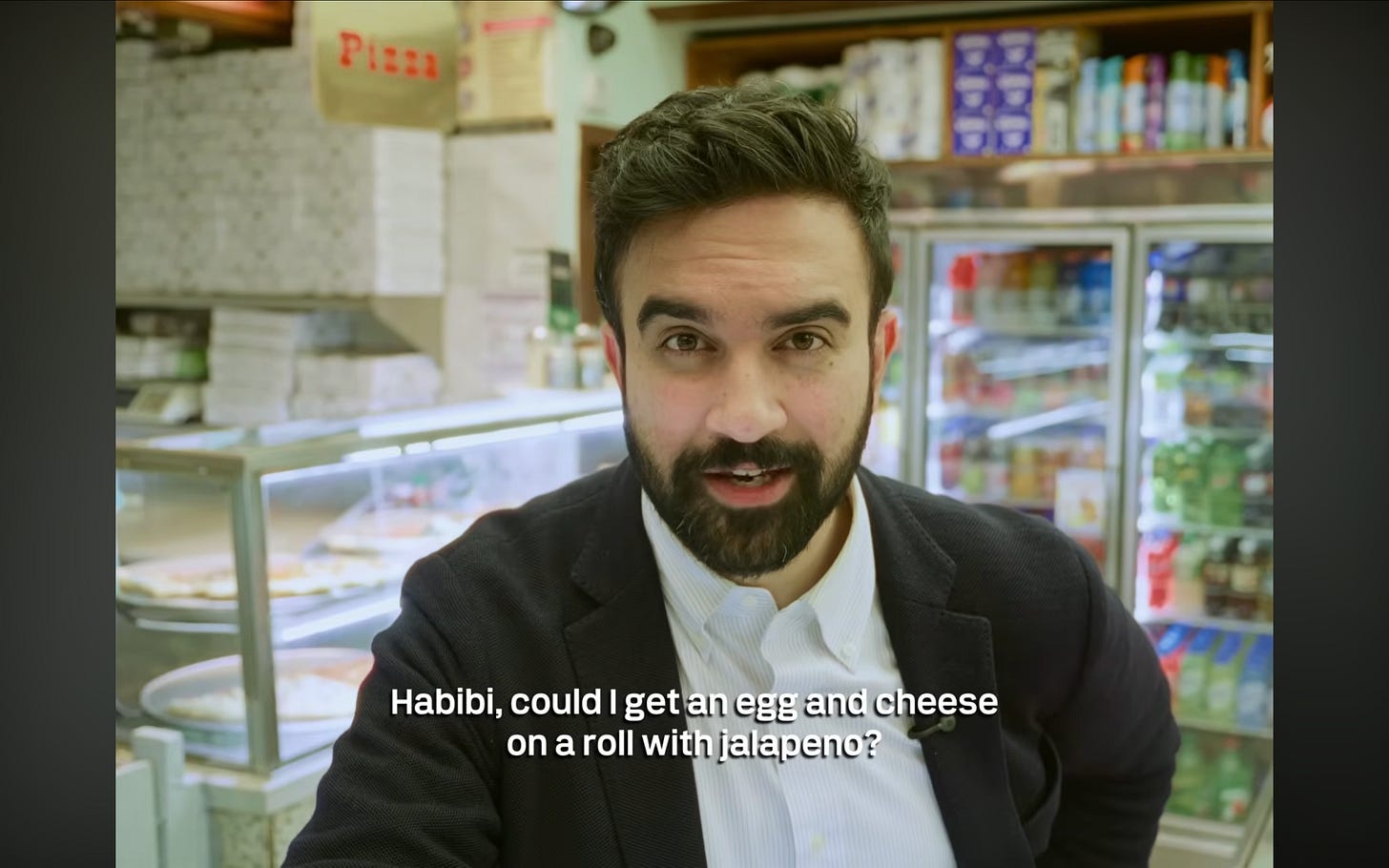
Khan believes that if Mamdani was in office, he would hire professionals that would support small businesses. Currently, business owners like him routinely meet with the Department of Small Business Services, the city bureau that is supposed to help new businesses get off the ground and help existing ones get loans and licences. But ‘we don’t have a proper channel to access the small business services,’ Khan says, ‘even though the department has a budget of millions of dollars every year.’ To combat this, Mamdani has proposed cutting small business fees, speeding up the licencing process, and helping entrepreneurs navigate the bureaucracy that prevents many immigrants from setting up shop.
‘These are places of celebration and joy. But they are also places that end up exploiting our communities – and I think Zohran understands the complexity of that.’
It is perhaps unusual for a leftist candidate in the Western world to have such a strong focus on small businesses – ‘business-first’ is usually the domain of Republicans. Yet in his campaign, Mamdani has been careful to speak for the workers as well as the business owners, and appreciates that these two roles often overlap. Jagpreet Singh, the political director of DRUM Beats – a working-class coalition of South Asians and Indo-Caribbeans, and also one of the first organisations to endorse Mamdani for mayor – told me that many DRUM Beats members ‘work in these restaurants [that Zohran visits]’, ‘deal[ing] with harassment and wage underpayment. These are places of celebration and joy. But they are also places that end up exploiting our communities – and I think Zohran understands the complexity of that.’
Singh also points out that Mamdani has a nuanced appreciation of entrepreneurship that is centred equally on the social and economic aspects of business. Many young white socialists in New York are suspicious of enterprise and capital on an ideological level, but Mamdani’s socialism stems ‘not from ideology’ as Singh says, but from an appreciation of lived experience ‘within our communities’. The evening of our interview, Singh invited me to Jackson Heights, one of the most culturally and economically diverse neighbourhoods in the world, where Mamdani handed out Diwali sweets to everyone.
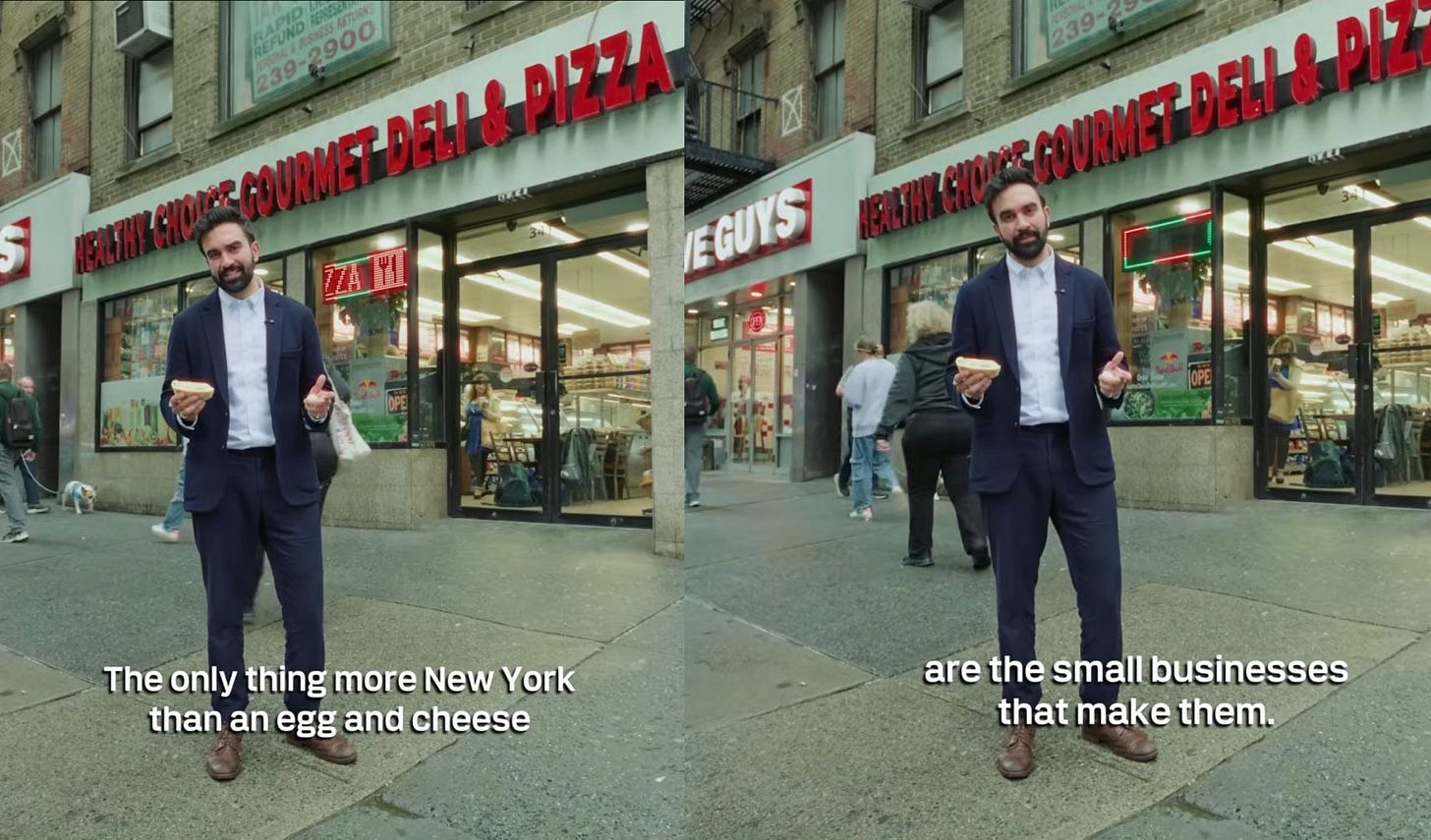
Whether in New York or London, food establishments are crucial to big-city life for so many reasons. They serve as either a break from, or a bolster for routine, forcing us to interact with other people at a time when avoiding human contact has become normalised (consider the advertisements for the delivery app Seamless that were once ubiquitous on the New York subway, boasting the chance to eat meals with zero human contact). As streets in global capitals are homogenised by billionaire-owned chains and private equity, Mamdani highlights that small-food businesses add an unquantifiable joy to the experience of living in a dense, fast-paced city. These are the places which offer experiences that momentarily elevate life in New York from survival to enjoyment.
‘As streets in global capitals are homogenised by billionaire-owned chains and private equity, Mamdani highlights that small-food businesses add an unquantifiable joy to the experience of living in a dense, fast-paced city’
Even though he would be the first Muslim mayor of New York, and often refers back to his Ugandan, Indian and South Asian heritage, Mamdani isn’t running on something as empty as ‘diversity’. Unlike Kamala Harris’s presidential campaign in 2024, his campaign ties the multiculturalism of New York’s immigrant communities to the universally appealing goal of affordability. ‘I will be a mayor who’s ready to speak at any time to lower the cost of living … that’s the partnership I want to build [with] Washington’, Mamdani said in a recent interview. As New York gentrifies, it becomes harder to eat well and even harder to keep the city fed. In the end, how affordable a city is, determines how it eats.
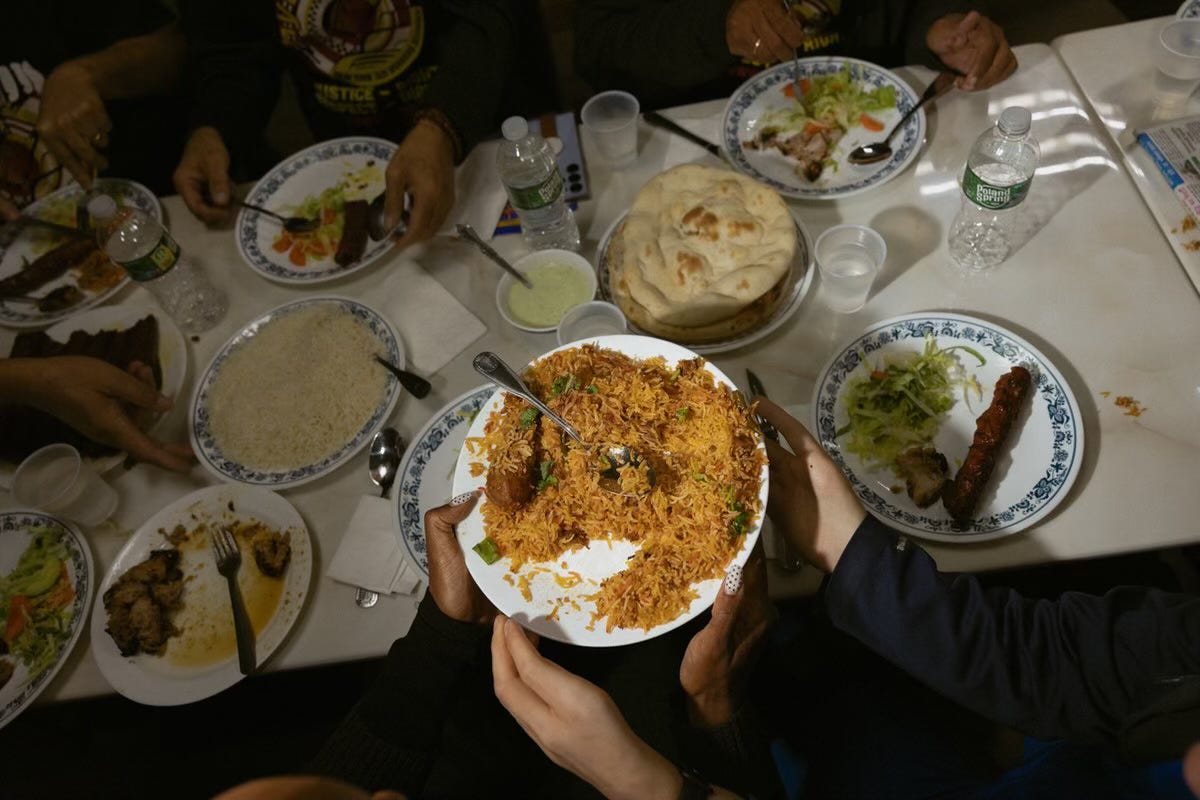
At Kabab King, a halal restaurant in Jackson Heights, you will often spot taxi drivers who are finishing up late-night shifts. Sometimes they come from as far as Philadelphia or New Jersey to drink tea and chat about their passengers. From 1997 until 2019 , Kabab King was open twenty-four hours a day – and on any given day, you can hear several languages being spoken, and see various social and political gatherings or family outings. On Sundays, it’s home to the Jackson Heights Community Church, which holds its service on the top floor of the restaurant. ‘It’s community spaces like these where the people who keep the city running convene,’ Dandia says. ‘This is where they find rest between work and home.’
Mamdani has been eating at Kabab King since he was in high school, and later he rented out the top floor of the restaurant to film the music video for his song ‘Nani’, which features Madhur Jaffrey). When I went there for dinner a few weeks ago, I overheard a woman tell her friends that she had also been going there since she was a little girl. To me, this resonated with what Mamdani meant when he said to his opponent Andrew Cuomo that ‘This is a city to be loved, not a city to be feared.’
Kabab King is a successful medium-sized business that doesn’t rely on Mamdani’s policies to function. In fact, the target audience of Mamdani’s small business proposals might even be new businesses that compete with Kabab King. And yet this didn’t stop the restaurant from creating a viral TikTok that featured Mamdani shortly before the Democratic primary in June, encouraging people to vote. If more businesses come up in Jackson Heights, the manager Shahrukh Ali tells me, ‘in the end, that still benefits us’. They have worked with neighbouring restaurants in the past, holding events in each other’s spaces when needed. ‘We are in the business of catering,’ Ali added, ‘not just food. We’re here to cater to our people. I see that in Zohran Mamdani as well.’
Credits
Apoorva Tadepalli is a freelance writer based in Queens, New York.
The Vittles masthead can be viewed here.


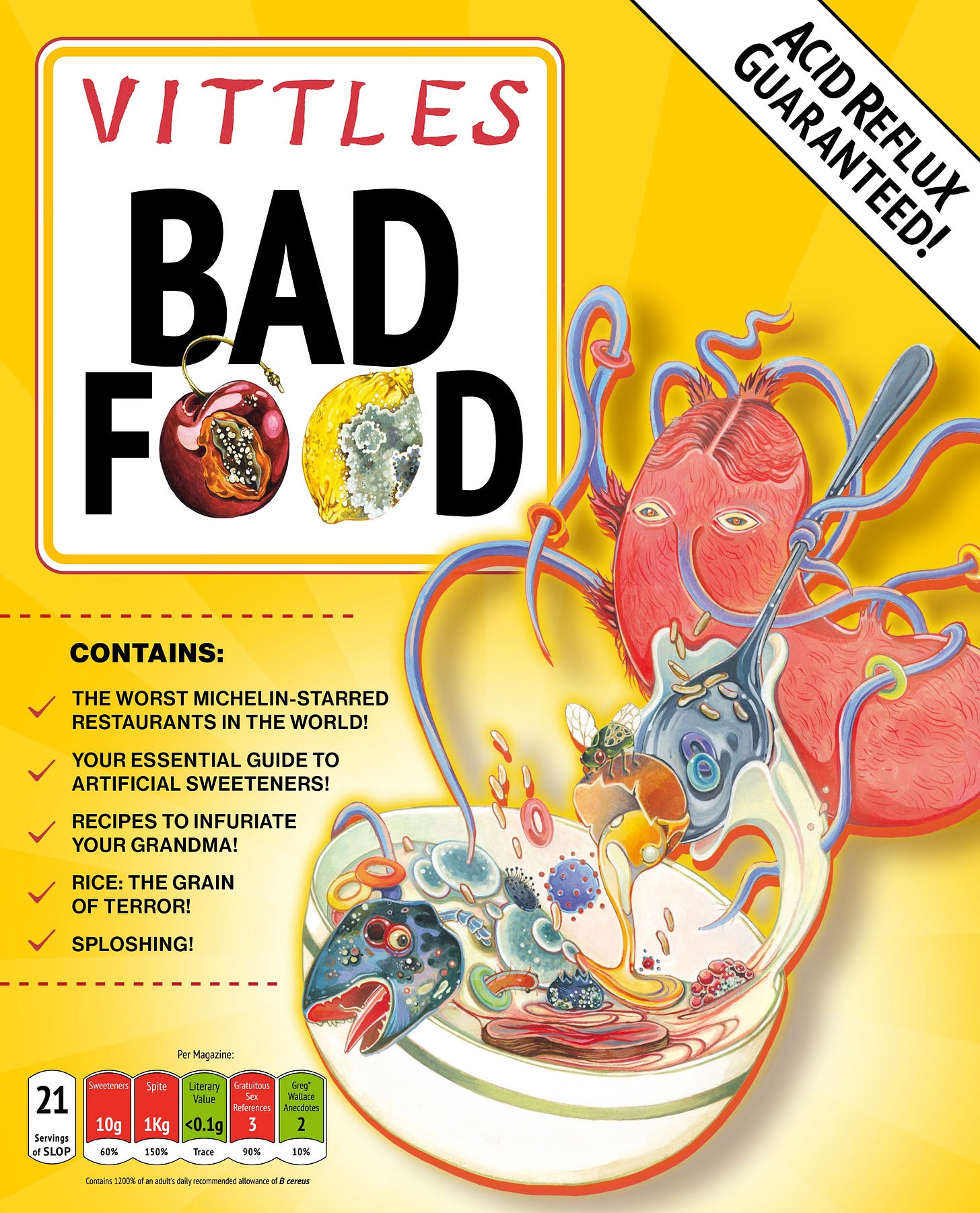
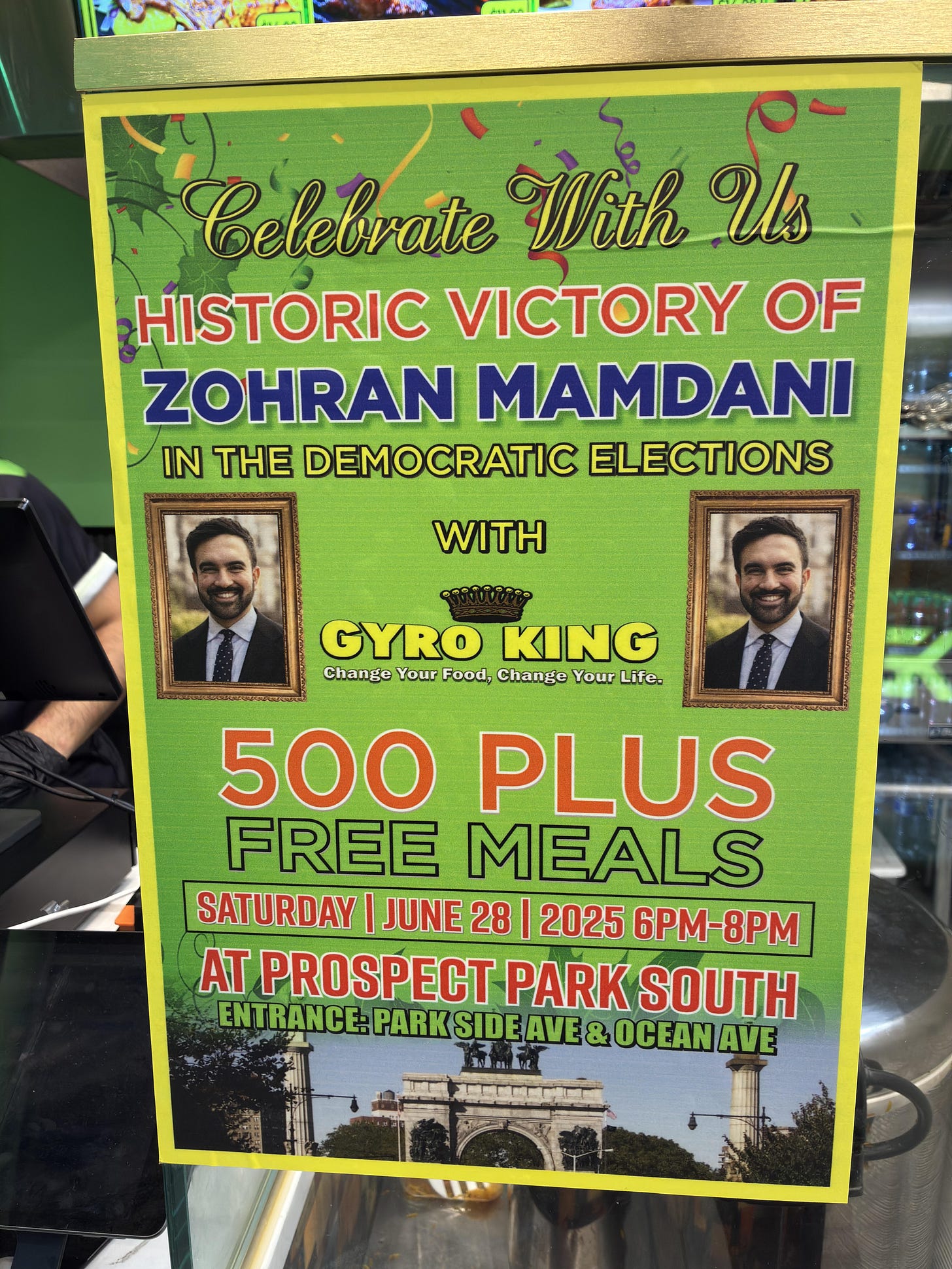
That’s my mayor!!! (I’m from the UK)
"Mamdani has a nuanced appreciation of entrepreneurship that is centred equally on the social and economic aspects of business......... Mamdani’s socialism stems ‘not from ideology’ but from an appreciation of lived experience ‘within our communities’. " Brilliant, insightful, inspiring piece that should be essential reading for Labour Councillors, not to mention Rachel Reeves. Heartbreaking to see what is happening to hospitality in London.